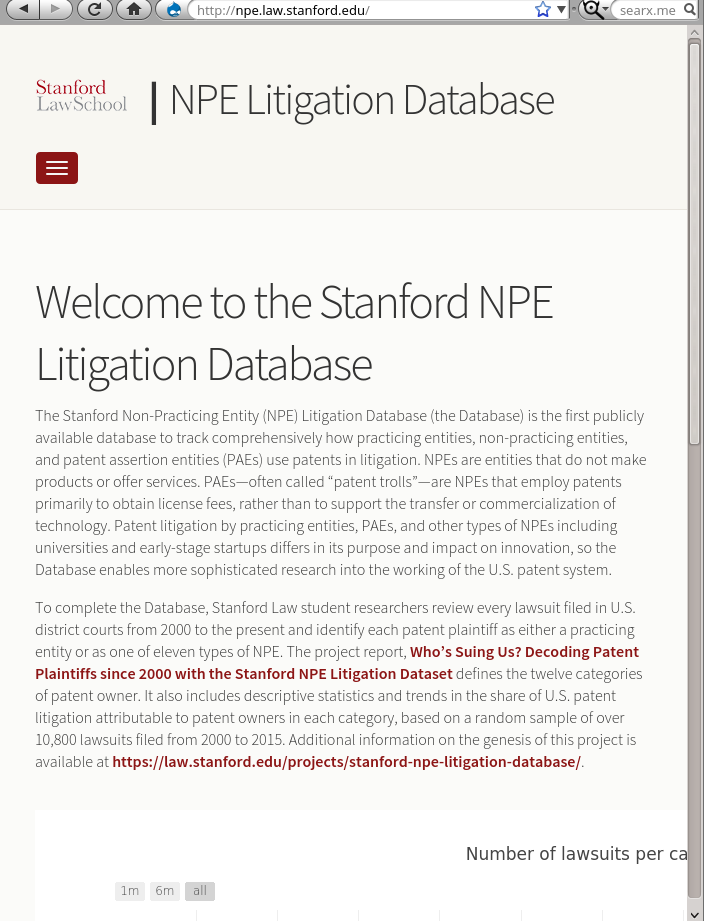

THE courts system in the United States may be in flux (Donald Trump makes it a lot worse in a lot of ways), but for the time being it continues to reject software patents. Every single 35 U.S.C. ۤ 101 case we come across (and put in our daily links) seems to result in invalidation. This has, predictably, harmed patent trolls (who depend on such patents).
"Every single 35 U.S.C. ۤ 101 case we come across (and put in our daily links) seems to result in invalidation. This has, predictably, harmed patent trolls (who depend on such patents).""I'm pleased to announce the Stanford NPE Litigation Database," Prof. Lemley wrote this week. "We have coded every patent plaintiff in every suit from 2007 through 2017 into one of thirteen different categories. The database is open to anyone who wants to do research on patent litigation." It can be found here (NPE Litigation Database). It was mentioned here in passing earlier this week after Prof. Risch had mentioned it.
Patent trolls are on the decline/demise, but they haven't gone away. The patent extremists try hard to pave the way for their comeback.
Case of point? Watchtroll speaks of "House IP Subcommittee Discusses Section 101" in yesterday's roundup about U.S. Patent and Trademark Office (USPTO) matters and discussions in the Congress/House. Coons et al might try to change things, but they have no support and Joe Mullin of the EFF has just issued a call for public input. This is a third year/attempt to screw the patent system on behalf of patent trolls and this year too it has already fallen off the news/headlines (same as in previous years around the same time). To quote Mullin:
There’s no published bill yet, but Senators Thom Tillis (R-N.C.) and Chris Coons (D-Del.) have published a “framework” outlining how they intend to undermine Section 101 of the U.S. patent law. That’s the section of law that forbids patents on abstract ideas, laws of nature, and things that occur in nature.
Section 101’s longstanding requirement should be uncontroversial—applicants have to claim a “new and useful” invention to get a patent—a requirement that, remarkably, Tillis and Coons say they will dismantle.
In recent years, important Supreme Court rulings like Alice v. CLS Bank have ensured that courts give full effect to Section 101. That’s given small businesses a fighting chance against meritless patents, since they can be evaluated—and thrown out—at early stages of a lawsuit.
Check out the businesses we profile in our “Saved by Alice” page. Patent trolls sued a bike shop over message notifications; a photographer for running online contests; and a startup that put restaurant menus online. It’s ridiculous that patents were granted on such basic practices—and it would be even more outrageous if those businesses had to hire experts, undergo expensive discovery, and endure a jury trial before they get a serious evaluation of such “inventions.”
Listen to our interview with Justus Decher. Decher’s health company was threatened by a company called MyHealth over a patent on “remote patient monitoring.” MyHealth never built a product, but they demanded $25,000 from Decher—even before his business had any profits.
Why is the Tillis-Coons proposal moving forward? Pharmaceutical and biotech companies are working together with lobbyists for patent lawyers and companies that have aggressive licensing practices. They’re pushing a false narrative about the need to resolve “uncertainty” in the patent law. But the only uncertainty produced by a strong Section 101 is in the profit margins of patent trolls and the lawyers filing their meritless lawsuits.